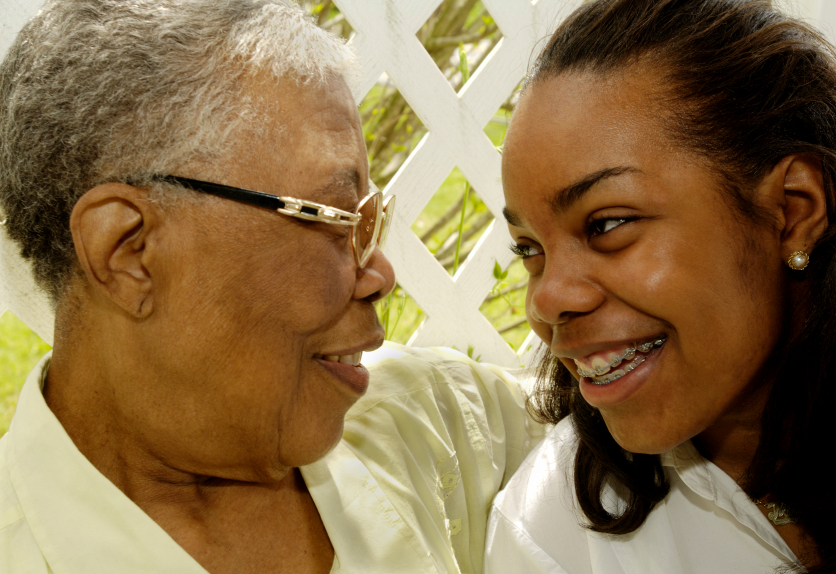A number of factors can change an aging family member's ability to communicate. The aging process can reduce sight and hearing, and both speech and understanding can be affected by cognitive changes resulting from a stroke, dementia or other health conditions.

This can make communication difficult and can be extremely frustrating for both the caregiver and for the elder person. However, it's important to maintain communication as best you can and there are certain things you can do to make it easier.
Sight problems.
- Reduced vision can happen over time or literally overnight as the result of a stroke. Either can limit an individual's ability to obtain information and reduce understanding of what's happening.
- Ensure eyeglass prescriptions are current and that glasses are clean and in good condition.
- Buy a large magnifying glass.
- Purchase or borrow books on tape and musical recordings.
- Make sure the older person has a radio, preferably with large, simple controls.
- Try large print books and magazines. Many are available at libraries.
- Check that home lighting is effective, particularly in stairways, the bathroom, food preparation and dining areas and exterior entrance ways.
- Vision problems may make tasks like paying bills difficult. Check whether help is needed.
- Remember the importance of touch. A hug or reassuring squeeze can mean a lot when vision is impaired.
Hearing loss. Although usually a gradual process, hearing loss can also happen suddenly as a result of a stroke or other critical illness. Hearing loss is not only frustrating for all concerned, it can also affect safety through reduced awareness of one’s surroundings.
- Arrange for regular hearing tests.
- Check that hearing aids, if used, are properly fitted and functioning.
- Ask health care providers about local services for the hearing impaired.
- Ask whether speaking more loudly or slowly is helpful to the family member.
- Enjoy conversation in quiet surroundings and at times when you can focus on the elder individual without interruption.
- During conversations, occasionally repeat what the hearing impaired person has said. It shows you are listening and helps to ensure understanding.
Cognitive changes. Strokes and conditions, such as Alzheimer's Disease, can affect both speech and understanding. However, the two don't always go hand in hand. For example, stroke-related speech problems can sometimes be due to partial facial paralysis, while cognitive understanding remains normal.
- Talk with healthcare providers to gain a full understanding of the older person's condition. Ask how you can help with therapy or daily communication.
- Speak directly, simply and, if necessary, more slowly.
- Try to be patient and accept the elder's loss of abilities. Remind children that the condition isn't the older person's fault and can't be controlled.
- Communicate in other ways—hugs, smiles and reassuring touch.
Social withdrawal. You may find that communication frustrations cause your older family member to withdraw from contact with others. This can make him or her more dependent on you, and can add to the care giving responsibilities.
Watch for signs that this may be happening and try to find ways to keep the elder in contact with the outside world.
- Help friends and family members understand the limitations. Share communication strategies with them.
- Encourage contact with people who have previously been close to the older person.
- Look for senior centre activities that focus on the older person's special interests.
- Watch for signs of depression including lethargy, appetite loss and sleep pattern changes. If necessary, discuss the situation with healthcare providers.
If your elder loved one faces challenges to effective communication as they age, remember that it’s surely more frustrating for them than for you. Now more than ever it’s important to find ways to reach out to them and work towards closeness and understanding.
